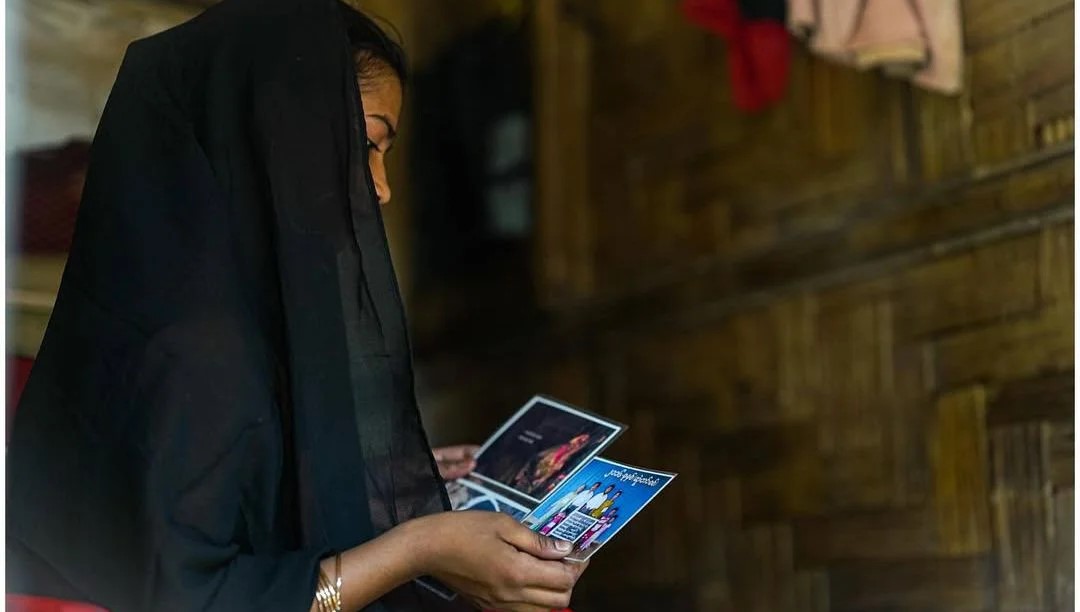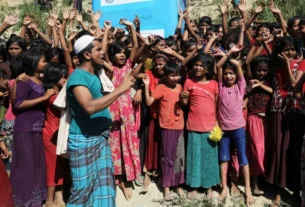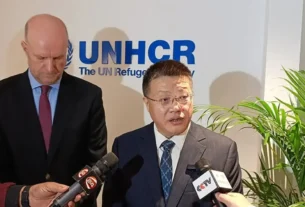By
The “Arakan Army” (AA) has long portrayed itself as a liberation force fighting against Myanmar’s military junta, but the reality is far darker. While the junta’s atrocities against the Rohingya, Rakhine people act as paramilitary are well-documented, the AA’s actions reveal an even more insidious threat—one that not only perpetuates violence but ensures that Rohingya will never see justice, safety, or basic rights under its rule. Many documents of Arakan residents that the AA’s brutal tactics, ethnic exclusion, and authoritarian governance, proving that it is worse than the junta in key ways and that Rohingya will remain oppressed under its control.
The oppressive policies of the “Arakan Army” (AA) towards the Rohingya are similar to those of the Myanmar Junta,” said Elaine Pearson, Asia Director of Human Rights Watch
In fact, allegations of abuses and atrocities by the “Arakan Army” are not new. Reports of these abuses emerged as early as late 2019, when the group formally announced its presence in Arakan State. Chin ethnic minorities in the Paletwa region have reported abuses by the “Arakan Army”. Similarly, the group abducted NLD candidates during the 2020 election campaigns.
As the “Arakan Army” expanded its operations in Arakan State, it began committing widespread crimes against the local Rohingya population in northern Arakan from late 2019 through 2020, during the COVID-19 crisis. The group used the crisis as a pretext to beat, torture, and extort the local Rohingya minority, while also confiscating their lands and crops, according to ground reports.
In late November 2020, a couple of months prior to the Myanmar junta’s coup in February 2021, the “Arakan Army” reached a ceasefire agreement with the junta, which would need to redirect its resources to suppress the uprising soon. The “Arakan Army” exploited this opportunity to establish a stronghold in the region, primarily targeting the Rohingya and replicating the same pattern of oppression (notably in Minbya). It also targeted other minorities, particularly Mro Buddhists, who, like other minorities in the state, opposed the forced conscription of underage fighters and unjust extortion disguised as duties or taxes.
While the junta is rightly condemned for its genocidal campaigns against the Rohingya, the AA has shown equal disregard for civilian lives including Rohingya in its quest for power and control.
In May 2025, the AA’s aggressive offensives in Kyaukphyu, Rathedaung, and Kyauktaw led to junta airstrikes that killed dozens of civilians. The AA knew its attacks would provoke military retaliation, yet it continued operations in populated areas, using Muslim civilians as human shields in the frontline and tied up in their tents.
“A Rohingya woman said “my three sons were abducted and used in the frontline after a week of training. Now the three sons are dead and I have no information about them”.
Similarly, Arakan Now reported on 28 July that the “Arakan Army” (AA) abducted 60 Rohingya while they were working on farmland in Sein Hnyin Pya and Tha Baik Taung villages in Buthidaung Township on 25 July. Their families remain unaware of their current whereabouts. These farmers are forced to pay taxes to the AA, and since they have no other sources of livelihood, they continue working on the land despite the risks.
In June 2025, the AA escalated fighting in Kyaukphyu and Ayeyarwady, resulting in the deaths of women and children, including a 12-year-old girl in Thandwe. The AA’s shelling of military battalions in civilian zones ensured that non-combatants paid the price.
A person reported that a Muslim girl was sexually abused in Kyaukphyu by the AA’s army who is his relative
The AA has also planted landmines along the Bangladesh border, injuring civilians including Bangladeshi youths further destabilizing the region.
Unlike the junta, which at least pays lip service to “stability,” the AA thrives on perpetual war, ensuring Rakhine remains a warzone where Rohingya are caught in the battlefield. Almost three lakhs Rohingya were displaced in Bangladesh in 2024 but the remaining Rohingya were not returned back in their home and isolated in some fixed area while AA forces are timely threatening them to kill if there are any ARSA troops in that area.
The AA’s economic policies have been catastrophic, deliberately worsening conditions for Rohingya while consolidating power.
In May 2025, the AA shut down cross-border trade with Bangladesh, cutting off food and medicine supplies. Rohingya, who rely heavily on this trade, were left starving.
A Rohingya family of five, who had fled to Bangladesh in 2024, returned to Maungdaw in the middle of July 2025. Upon learning of their return, the “Arakan Army” (AA) conducted a raid but did not find the householder. They then demanded a fine of 50 lakh kyats. As a result, the family fled back to Bangladesh, according to a report by The Daily Star.
By June 2025, the AA’s mismanagement led to a banknote crisis, where worn-out currency was rendered worthless. Rohingya, already impoverished, were forced to exchange money at half value and economic death sentences.
As the “Arakan Army” gained control of most of Arakan State, it has allegedly intensified its illicit cross-border narcotics and other activities harmful to Bangladesh. This has significantly enriched the group, enabling it to hire PR firms and agents to lobby foreign governments on its behalf. Recently, numerous “Arakan Army” members have been apprehended in Bangladesh with weapons and drugs.
According to reliable ground sources, a 35-year-old Rohingya man, Shuna Mia (F) Nazir, a resident of Nghat Chaung Refugee Camp 2 in Pauktaw Township, was arrested by the “Arakan Army” (AA) on July 15, accused of theft. On July 28, the AA regional chief informed the camp leader that Shuna Mia had escaped from custody. However, the following morning, on July 29 at approximately 7:30 AM, his body was found with visible injuries near Kan Seik Rakhine village. This is one of the instances of persecution by the rebel group among many.
The AA also banned cattle exports to Bangladesh, a key Rohingya livelihood, and arrested traders for smuggling fertilizer another essential commodity for Rohingya farmers. While AA is using Rohingya as their porter to carry Yaba (WY) in Bangladesh.
A young Rohingya boy reported that my father is a fisherman but AA used him to carry WY and now he is arrested by the Bangladesh border guards. We don’t know where he is now.
The junta, for all its faults, at least allowed some trade. The AA, however, imposes total economic control, ensuring Rohingya remains destitute and dependent.
The AA claims to fight for “Arakanese” rights, but its vision is explicitly ethno-nationalist, excluding Rohingya entirely.
The Rohingya activists and citizen journalists, however, chose conscious silence on this early persecution of the Rohingya, hoping that the “Arakan Army” would differ from the Myanmar junta and that fostering a good relationship with them would promote understanding and genuine respect between their groups. The “Arakan Army” rather perceived this silence as weakness, intensified its oppression, and continued to commit genocidal crimes against the Rohingya while exploiting their overseas Rohingya contacts to advance its agenda, a betrayal of their kindness.
The Arakan People’s Revolutionary Government (APRG), the AA’s political wing, has repeatedly indicated about the army group movement when the Bangladesh government talks about Rohingya repatriation and refuses to grant them citizenship or basic rights.
While the AA resettled Rakhine Buddhists in Mrauk-U and Kyauktaw, Rohingya IDPs were denied aid and forced to flee to Bangladesh.
The AA’s so-called humanitarian efforts such as freeing prisoners of war never include Rohingya detainees. Even when Rohingya are victims of violence (like the rape and murder of a child in Minbya), the AA does nothing to protect them. There are thousands of Rohingya in the AA’s detention center but none of them are released yet.
“There were many of my villagers conscripted by Junta and AA who arrested them with the junta. Now we don’t have any information about them,”
The junta, at least under international pressure, has occasionally allowed limited Rohingya aid. The AA, however, operates with zero accountability, ensuring Rohingya remains stateless and persecuted.
The AA’s Long-Term Plan: A Rakhine Buddhist State Without Rohingya. The AA is not fighting for democracy. It is fighting for an ethnically pure Rakhine state. The AA’s alliance with other ethnic armed groups is purely strategic—none of them advocate for Rohingya rights.
Unlike the junta, which faces global condemnation, the AA enjoys misguided sympathy from some Western observers who see it as “anti-junta.” But the truth is clear: ”
AA will never allow Rohingya to return, let alone grant them rights because they are worse than the junta and Rohingya has no future under it, said Ali Jinnah Hussin.
The international community must stop romanticizing the AA as “freedom fighters.” They are warlords who will turn Rakhine into a permanent apartheid state. If the world truly cares about Rohingya, it must recognize the AA as the greater evil and act before it’s too late.




